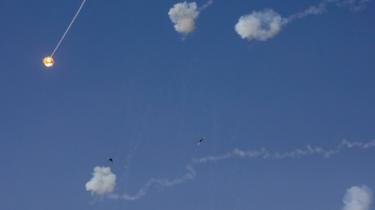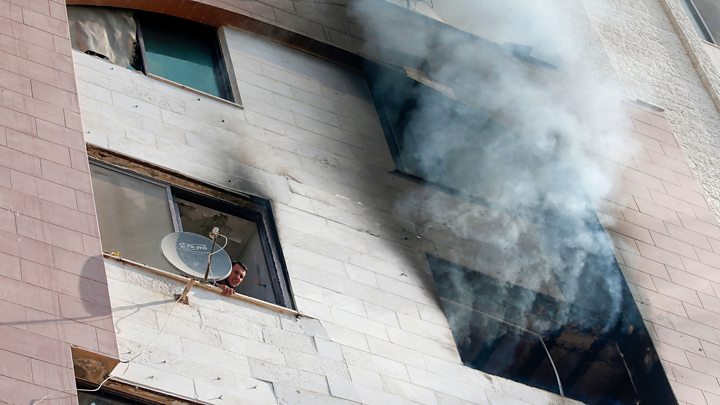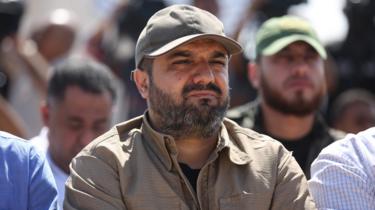Palestinians gathered around a house destroyed in an air strike in Khan Younis, where Israel said it had targeted a military headquarters
Cross-border violence between Israel and militants in Gaza is continuing, a day after an Israeli air strike killed a Palestinian Islamic Jihad commander.
After an overnight lull, rocket fire towards Israel resumed and Israeli aircraft conducted retaliatory strikes.
Gaza's health ministry said 12 Palestinians were killed by Israeli fire on Wednesday, bringing the death toll there to 22 since Tuesday.
In Israel, almost 50 people have been treated for injuries or anxiety.
Egyptian and UN officials have been attempting to de-escalate the situation, but PIJ has said it is not yet "appropriate" to talk about mediation.
What is the latest?
After a six-hour pause, Palestinian militants resumed firing rockets at around 06:30 (04:30 GMT), triggering air-raid sirens in southern and central Israel.
The Israel Defense Forces (IDF) said more than 50 rockets had been launched by midday, bringing the total since Tuesday to 250. There were no immediate reports of injuries or damage.
 AFP
AFP
The IDF said it had bombed more PIJ targets in Gaza on Wednesday in response, including a military headquarters in Khan Younis and a factory manufacturing warheads for long-range rockets in the south of the strip.
The Hamas-run health ministry in Gaza reported that 12 people had been killed.
What happened on Tuesday?
A pre-dawn Israeli air strike on a residential building in eastern Gaza City killed Baha Abu al-Ata, a senior PIJ military commander, and his wife.
At about the same time, the home of another leader of the Iran-backed group was struck by an Israeli missile in Damascus, killing two people, Syrian state media said. Israel did not comment on the incident.

Israel's Prime Minister, Benjamin Netanyahu, described Abu al-Ata as an "arch-terrorist" and a "ticking bomb" who posed an imminent threat to the country.
Abu al-Ata was thought to be behind recent rocket fire from Gaza and to have acted increasingly outside of the control of the dominant militant faction Hamas.
Militants in Gaza said Israel had crossed a "red line" and fired more than 200 rockets in response.
About 90% of the rockets were intercepted by Iron Dome air defence systems, the IDF said, but one exploded on a main road close to passing cars, and elsewhere two people were lightly injured by shrapnel. An eight-year-old girl also suffered a heart attack in a bomb shelter and remains in a serious condition.
IDF said it carried out air strikes in Gaza targeting PIJ rocket-launching units and infrastructure.
Gaza's health ministry said eight people were killed, in addition to Abu al-Ata and his wife. Seven of them were reportedly militants.
What are both sides saying?
PIJ spokesman Musab al-Buraim told the Hamas-linked Shehab news agency that it was not "appropriate" to discuss Egyptian efforts to end the flare-up when the group was still retaliating for Abu al-Ata's death.
 AFP
AFP
"When we complete the response, it is possible to discuss calm," he said.
At the start of a special cabinet meeting on Wednesday, Mr Netanyahu warned PIJ that if it did not halt the rocket fire Israel would continue to hit Gaza.
"Either stop these attacks or absorb more and more blows," he said.
Earlier, IDF spokesman Brig Gen Hidai Zilberman told Israeli media that PIJ was "operating in a measured way, maintaining its arsenal of rockets for several days of battle and is keeping its options open", and that the IDF was "walking a tightrope" to avoid drawing Hamas into the conflict.
Source of the news: BBC NEWS

No comments:
Post a Comment